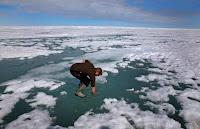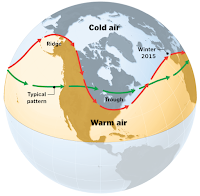Here, as close to the top of the world as you can get in America [at Barrow, Alaska, the continent’s northernmost city], the signs are serious indeed: the Arctic Ocean is melting faster than at any time on record. This February, the sea ice that stretches from North America to Russia reached its lowest-known winter extent and began melting 15 days earlier than usual. That continued a three-decade trend that has seen the ocean’s ice lose about 65 percent of its mass and about half of its reach during the summer. In 20 or 30 more years, the Arctic Ocean could be nearly devoid of ice in the summer, climate scientists believe.
The rapid changes in the Arctic have consequences well beyond Barrow, altering ocean currents, weather patterns, and temperatures across the planet.
Cold Arctic temperatures are typically distributed in a way that affects the polar jet stream.
The jet stream abuts the irregular pattern formed by the warming Arctic region and radical weather ridges and troughs developed.
Scientists have attributed Boston's historic cold spell and snowfall last winter to shifts in the polar jet stream.
- The normal polar jet stream has typically kept cold arctic air north of the mainland US in the winter.
- The changed jet stream though has pushed cold weather down into the Eastern US, and pulled warm weather up through the western US and Alaska.
Read more at The Big Unchill - by David Abel | Globe Staff


No comments:
Post a Comment